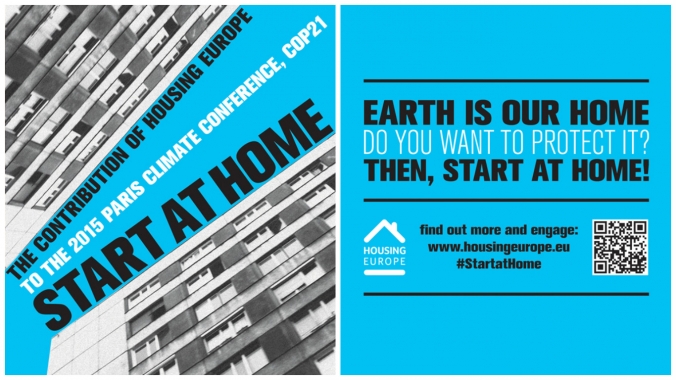Start at Home
The contribution of Housing Europe to COP21
Paris, 30 November 2015 | Published in Energy
Why the fight against climate change should start at home. The contribution of Housing Europe to the 2015 Paris Climate Conference, COP21
Our homes hold the key to our planet’s future. Why it is important to start at home if you want to fight climate change.
Europe’s Public, Cooperative and Social Housing Providers have already proven and renew their commitment to fight climate change.
We have already started delivering the promises we made at the UN Climate Change Conference in Copenhagen (COP15) in 2009 …
What our homes can do
- From 2010 to 2015 we estimate that
- 1.843.000 dwellings within our stock have been refurbished
- The average refurbishment rate over the last 5 years is 6,2 %
- Annually, our members refurbish approximately 1,2 % of their stock
- The homes in our members’ stock offer an average energy saving of 45 kWh/m2/year
- The tenants living in the homes we manage save on average 724 € on their energy bill per year thanks to the improved energy performance
- In total, we have invested more than 32,8 billion Euros in refurbishment projects
- On average, our members invest 20.000 € for each renovation
- The average payback time amounts to 26 years
- 1.843.000 dwellings within our stock have been refurbished
- These investments have been a significant employment generator, creating
- A total of 506.550 full-time jobs
- Or an average of 15 jobs per 1 million Euros invested
* Sources: Housing Europe Observatory, NEUJOBS, Eurostat, BEEM-UP and Power House nZEC European projects
-
Improving quality through innovation
- Energiesprong has made Net Zero Energy refurbishments a market reality that is financed of the energy cost savings, since a house does not consume more energy than it produces (E=0); plus, it only takes 10 days and comes with a 30-year energy performance warranty from the builder, while energy bills for residents stay the same.
- Most of our members are already actively involved in the decentralised EU energy market, paving the way for the Energy Union. Smart grid and smart meters facilitate the creation of smart green living spaces, ensuring that energy is accessible and affordable for all.
- Power House nearly Zero Energy Challenge has pooled expertise and thanks to a large and diverse EU-wide cooperation the gap in the market regarding real consumption data of our homes has been bridged.
- Spearheading developments in new construction as well, we have made the case for the need to set evidence-based new standards while reducing costs to maximize offer. Kombohus, introduced by SABO in Sweden is a state of the art proof.
- Energiesprong has made Net Zero Energy refurbishments a market reality that is financed of the energy cost savings, since a house does not consume more energy than it produces (E=0); plus, it only takes 10 days and comes with a 30-year energy performance warranty from the builder, while energy bills for residents stay the same.
What our homes need
Despite the global financial crisis we’ve had the plan, the expertise and the experience to deliver.
At these challenging times we have to foster continuation of support to the affordable housing sector so that it can keep making an even more significant contribution to the fight against climate change.
1. Empowering and involving citizen-consumers and communities
This will be key to unlocking the full potential of every green energy transition strategy already under way. Therefore, the role of local partnerships with energy companies, the construction sector and housing providers will be crucial in improving the ability of tenants to use their homes the best way possible.
2. Adequate finance for energy efficiency
Strengthen conventional and alternative ways to provide long-term low-cost capital financing for the renovation of social housing.
3. New energy market design
Housing should become part of the energy grid and housing associations should take the lead in becoming energy providers, too. Better, more effective combination/mix of Renewable Energy Sources (RES) and Energy Efficiency policies should be a priority.
4. Enabling EU legislation
Both the EPBD and the EED should be turned into instruments to support local partnerships using cost effective measures.
Earth is our home.
Do you want to protect it?
Then, Start at Home!
